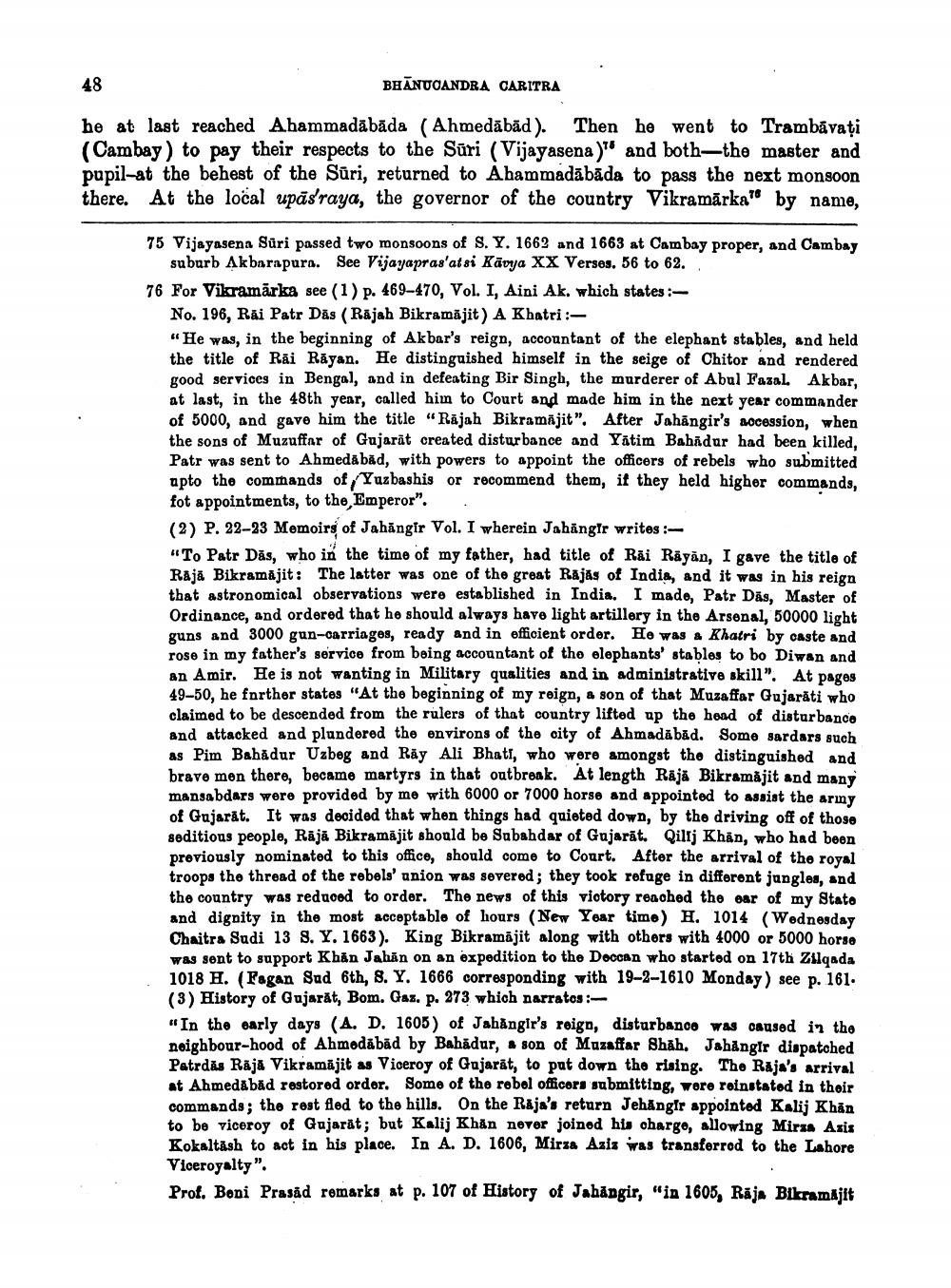________________
48
BHĀNUCANDRA CARITRA
he at last reached Ahammadabāda (Ahmedābād). Then he went to Trambāvați (Cambay) to pay their respects to the Sūri (Vijayasena)" and both—the master and pupil-at the behest of the Sūri, returned to Ahammadābāda to pass the next monsoon there. At the local upās raya, the governor of the country Vikramārka" by name,
Bangles ho de bien buhen
75 Vijayasena Sūri passed two monsoons of S. Y. 1662 and 1663 at Cambay proper, and Cambay
suburb Akbarapura. See Vijayapras'atsi Kāvja XX Verses, 56 to 62. 76 For Vikramārka see (1) p. 469-470, Vol. I, Aini Ak. which states :
No. 196, Rāi Patr Das (Rajah Bikramăjit) A Khatri :"He was, in the beginning of Akbar's reign, accountant of the elephant stables, and held the title of Răi Răyan. He distinguished himself in the seige of Chitor and rendered good services in Bengal, and in defeating Bir Singh, the murderer of Abul Fazal Akbar, at last, in the 48th year, called him to Court and made him in the next year commander of 5000. and gave him the title “Rājah Bikramajit". After Jahangir's accession, when the song of Muzaffar of Gujarat created disturbance and Yatim Bahadur had been killed, Patr was sent to Ahmedabad, with powers to appoint the officers of rebels who submitted apto the commands of Yuzbashis or recommend them, if they held higher commands, fot appointments, to the Emperor". . (2) P. 22–23 Memoirs of Jahāngir Vol. I wherein Jahangir writes :"To Patr Dăs, who in the time of my father, had title of Rāi Rayan, I gave the title of Raja Bikramajit: The latter was one of the great Rajas of India, and it was in his reign that astronomical observations were established in India. I mado, Patr Däs, Master of Ordinance, and ordered that he should always have light artillery in the Arsenal, 50000 light guns and 3000 gun-oarriages, ready and in efficient order. Ho was a Khatri by oaste and rose in my father's service from being accountant of the elephants' stables to bo Diwan and an Amir. He is not wanting in Military qualities and in administrative skill". At pages 49-50, he farther states "At the beginning of my reign, & son of that Muzaffar Gujarati who claimed to be descended from the rulers of that country lifted up the head of disturbance and attacked and plundered the environs of the city of Ahmadābād. Some sardars such as Pim Bahadur Uzbeg and Ray Ali Bhati, who wore amongst the distinguished and brave men there, became martyrs in that outbreak. At length Rājā Bikramăjit and many mansabdars were provided by me with 6000 or 7000 horse and appointed to assist the army of Gujarat. It was decided that when things had quieted down, by the driving off of those seditious people, Rājā Bikramăjit should be Subahdar of Gujarāt. Qilij Khan, who had been previously nominated to this office, should come to Court. After the arrival of the royal troops the thread of the rebels' union was severed; they took refuge in different jangles, and the country was reduced to order. The news of this viotory reached the ear of my Stato and dignity in the most acceptablo of hours (New Yoar timo) H. 1014 (Wodnesday Chaitra Sudi 13 S. Y. 1663). King Bikramăjit along with others with 4000 or 5000 horse was sent to support Khån Jahan on an expedition to the Doocan who started on 17th Zilqada 1018 H. (Pagan Sud 6th, 8. Y. 1666 corresponding with 19-2-1610 Monday) see p. 161. (3) History of Gujarat, Bom. Gaz. p. 273 which narratos :"In the early days (A. D. 1605) of Jahangir's reign, disturbance was caused in the neighbour-hood of Ahmodābād by Bahădur, a son of Muzaffar Shāh. Jahangir dispatched Patrdās Rāja Vikramājit as Viceroy of Gujarāt, to put down the rising. The Raja's arrival at Ahmedabad restored ordor. Some of the rebel officors submitting, wore roinstatod in thoir commands: the rest fled to the hills. On the Raja's return Jehängir appointed Kali Khan to be viceroy of Gujarat; but Kalij Khan never joinod his charge, allowing Miris Axis Kokaltash to act in his place. In A. D. 1606, Mirza Aziz was transferred to the Lahore Viceroyalty". Prof. Boni Prasad remarks at p. 107 of History of Jahangir, "in 1605, Raja Bikramajit




